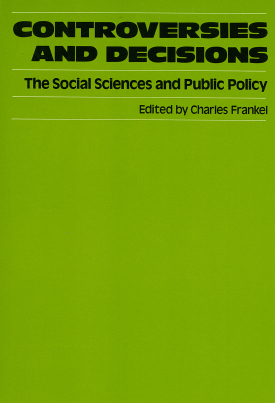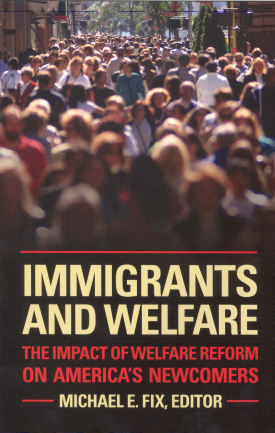The Legal System
About This Book
Examines the impact of social forces on the legal system and how the rules and orders promulgated by that legal system affect social behavior. Dr. Friedman explores the relationship between class structure and the work of legal systems in the light of the existing literature and analyzes the influence of the cultural elements contained in a legal system. In a comprehensive analysis of the concept of legal culture, the author sheds new light on the development of our legal norms and the types of legal systems which prevail in a democracy.
LAWRENCE M. FRIEDMAN is Marion Rice Kirkwood Professor of Law at Stanford University.
Download
RSF Journal
View Book Series
Sign Up For Our Mailing List
Apply For Funding

Controversies and Decisions
About This Book
Explores the various aspects of recent debates over the independence of the social sciences. The contributors are Kenneth E. Boulding, Harvey Brooks, Jonathan R. Cole, Stephen Cole, Lee J. Cronbach, Paul Doty, Yaron Ezrahi, Charles Frankel, H. Field Haviland, Hugh Hawkins, Harry G. Johnson, Robert Nisbet, Nicholas Rescher, Edward Shils, and Adam Yarmolinksy. The essays deal with such topics as the relation of "values" to "facts" in social science inquiry; the interplay of theoretical and practical considerations; the moral obligations of social science investigators in political contexts; and the ways and means of protecting and advancing the autonomy of the social sciences.
CHARLES FRANKEL is Old Dominion Professor of Philosophy and Public Affairs at Columbia University.
CONTRIBUTORS: Kenneth E. Boulding, Harvey Brooks, Jonathan Cole, Stephen Cole, Lee J. Cronbach, Paul Doty, Yaron Ezrahi, Charles Frankel, H. Field Haviland, Hugh Hawkins, Harry G. Johnson, Robert Nisbet, Nicholas Rescher, Edward Shils, and Adam Yarmolinsky.
Download
RSF Journal
View Book Series
Sign Up For Our Mailing List
Apply For Funding

Immigrants and Welfare
About This Book
The lore of the immigrant who comes to the United States to take advantage of our welfare system has a long history in America’s collective mythology, but it has little basis in fact. The so-called problem of immigrants on the dole was nonetheless a major concern of the 1996 welfare reform law, the impact of which is still playing out today. While legal immigrants continue to pay taxes and are eligible for the draft, welfare reform has severely limited their access to government supports in times of crisis. Edited by Michael Fix, Immigrants and Welfare rigorously assesses the welfare reform law, questions whether its immigrant provisions were ever really necessary, and examines its impact on legal immigrants’ ability to integrate into American society.
Immigrants and Welfare draws on fields from demography and law to developmental psychology. The first part of the volume probes the politics behind the welfare reform law, its legal underpinnings, and what it may mean for integration policy. Contributor Ron Haskins makes a case for welfare reform’s ultimate success but cautions that excluding noncitizen children (future workers) from benefits today will inevitably have serious repercussions for the American economy down the road. Michael Wishnie describes the implications of the law for equal protection of immigrants under the U.S. Constitution.
The second part of the book focuses on empirical research regarding immigrants’ propensity to use benefits before the law passed, and immigrants’ use and hardship levels afterwards. Jennifer Van Hook and Frank Bean analyze immigrants’ benefit use before the law was passed in order to address the contested sociological theories that immigrants are inclined to welfare use and that it slows their assimilation. Randy Capps, Michael Fix, and Everett Henderson track trends before and after welfare reform in legal immigrants’ use of the major federal benefit programs affected by the law. Leighton Ku looks specifically at trends in food stamps and Medicaid use among noncitizen children and adults and documents the declining health insurance coverage of noncitizen parents and children. Finally, Ariel Kalil and Danielle Crosby use longitudinal data from Chicago to examine the health of children in immigrant families that left welfare.
Even though few states took the federal government’s invitation with the 1996 welfare reform law to completely freeze legal immigrants out of the social safety net, many of the law’s most far-reaching provisions remain in place and have significant implications for immigrants. Immigrants and Welfare takes a balanced look at the politics and history of immigrant access to safety-net supports and the ongoing impacts of welfare.
MICHAEL E. FIX is senior vice president and director of studies at the Migration Policy Institute (MPI) and co-director of MPI’s National Center on Immigrant Integration Policy.
CONTRIBUTORS: Michael E. Fix, Frank D. Bean, Randy Capps, Danielle A. Crosby, Ron Haskins, Everett Henderson, Ariel Kalil, Neeraj Kaushal, Leighton Ku, Jennifer Van Hook, and Michael J. Wishnie.
Copublished with the Migration Policy Institute
RSF Journal
View Book Series
Sign Up For Our Mailing List
Apply For Funding
Pagination
- Previous page
- Page 42
- Next page
